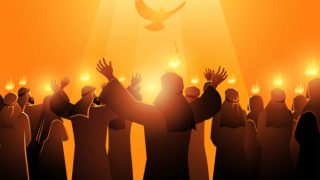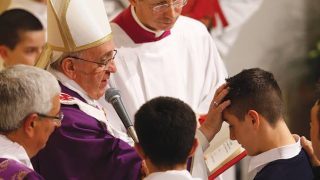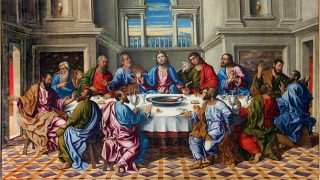
THE VOICE OF PRAYER IN THE UPPER ROOM
HOMILY FOR SEVENTH SUNDAY OF EASTER YEAR A. Readings: Act 1:12-14; Psalm 67; 1 Pet 4:13-16 and Jn 17:1-11.
Traditionally, after the Solemnity of Ascension of the Lord, we celebrate World Communication Sunday as Christ communicates with his Father in prayer, in fulfilment of the promise of the Holy Spirit. For pastoral reasons, the Solemnity of Ascension is celebrated today in some parts of the world. Meanwhile, we celebrate today the Seventh Sunday of Easter, which calls us to reflect on the events of the upper room; our participation in Christ’s suffering and His glorification.
From the first reading of today, we observe a notable obedience of the Apostles when Christ asked them not to leave Jerusalem but wait for the coming of the Holy Spirit (Acts 1:4) which was exactly what they did. They did not forget the sermon of Christ right after they heard it; they actually did what Christ told them even when he was no longer present with them physically. Returning to Jerusalem from the mount called Olivet, a Sabbath day’s journey described as a short distance, the only kind allowed on a Sabbath day, and when they had entered, they went up to the upper room.
The upper room signifies a place of prayer and also known as cenacle. It is the place where Christ washed the feet of the disciples, which symbolizes the ministry of his loving service; it is the place of the Last Supper; it is the place Christ he appeared to his disciples after the resurrection; it was in the upper room that Christ breathed the Holy Spirit on them after his resurrection (Jn 20:19). The upper room is the place where they waited for the outpouring of the Holy Spirit, together with the women and Mary the mother of Christ. It is a place of encounter with the Lord. The events that took place in the upper room continue to rest at the hearts of every Christian today as we prepare for Pentecost. We are invited to go to the upper room, that is, creating quiet time and place for prayer, a place we prepare and set aside for the habitation of the Holy Spirit. This place is our hearts. If this is done, then the power of the Holy Spirit will make us do things in one accord.
In the gospel of John, chapter 17 is known as Christ’ High Priestly Prayer. This prayer concludes the farewell dinner he had with his Apostles in the upper room. It is often called The High Priestly Prayer for two reasons: First, Christ is preparing to offer himself as a sacrifice for the sins of the world. Second, he intercedes for his disciples (vv. 6-26) in the same way the high priest intercedes for the people of Israel (Rm 8:34). This prayer is often likened to Moses’ farewell address (Deut. 31:30ff), which concluded with Moses’ final blessings on Israel (Deut 33). While Moses was preparing to die, he said, “You are happy Israel, who is like you, a people saved by Yahweh” (Deut 33:29). When Christ was preparing to die, he prayed, “Father, the hour has come; glorify your Son that the Son may glorify you, since you have given him power over all flesh, to give eternal life to all whom you have given him” (Jn 17:1-2).
For the glorification of the Son, the prologue of John is clear about it, “The Word (the Son) was with God” (1:1) “The Word became flesh and dwelt among us and we have seen his glory, the glory of the Father’s only Son, full of grace and truth” (1:14). So, the glory of the Son in this gospel, finds its culmination in the crucifixion, resurrection and ascension. The glorification of the Father lies in the obedience of the Son when he said, “I glorified you on earth, having acomplished the work which you gave me to do; and now, Father, glorify me in your own presence with the glory which i had with you before the world was made” (Jn 17:4-5). With this, there is a kinship here with Phil 2:6-11, which speaks of Christ as having emptied himself, taking the form of a slave, being born in human likeness. In this prayer, Christ looked forward to be restored to the glory that he enjoyed prior to his incarnation.
He began the prayer by saying, ‘Father, the hour has come,’ which refers to his death, resurrection and ascension. Earlier in John’s gospel, at the wedding feast at Cana where he changed water to wine, there was a reference that his ‘hour’ has not yet come. (2:4; 8:20). More recently, there were references to his hour having come, the hour of glorification when the wine was changed to his blood (12:23; 13:1). This blood will be shed on the cross. Importantly, all of his life from incarnation, Christ has been moving towards the cross and immediately after this prayer, he will be arrested and set on the path to the cross.
In the concluding part of the prayer, he said, “I am praying for them, I am not praying for the world but for those whom you have given me… I am no longer in the world, they are in the world” (Jn 17:3.9-11). In this prayer, while the hour of death was at hand, Christ offers up himself wholly into prayer by giving himself as sacrifice and intercedes for his disciples. He poured out his soul in life before he poured it out into death. Lifting up his eyes in prayers indicate that Christ looked up in hopeful sense and was not downcast nor depressed in this prayer. It also indicates the physical posture of Christ as he prayed, a custom common to his own days as seen in Ps 123:1; Mark 7:34 and Jn 11:41. This remarkable prayer is made with heart and mind. His heart and mind were fixed on the highest things, pledging himself to the fulfilment of the will of the Father no matter what it cost, so that eternal life could come to others. He made this prayer after affirmatively saying that his disciples will have hardship but they should be courageous for He has conquered the world (Jn 16:33).
While Christ prefigured the hardship and sufferings the disciples will pass, he prayed for them. In view of this that St. Peter tells us in the second reading to rejoice in so far, we share in Christ sufferings, for we shall be glad when his glory is revealed, just as Christ prayed for the Father to glorify the Son. He calls us to endure trials with right attitude. Instead of thinking of fiery trials as strange occurrences, we see them as ways to partake of Christ’s sufferings. For if we partake in his suffering, we shall also partake in his glory. Those who have suffered more in Christ will rejoice more at his coming in glory.
Conclusively, the liturgy of today gives us a summary of the mission of Christ, from his Incarnation to his death, resurrection and ascension. After his ascension was the events in the upper room and the prayer life of the Apostles. Let us recall that they were not perfect humans, they had their struggles and differences, but were able to subject all these in prayers and made a beautiful community. Three important lessons we can learn from the Apostles to better our community or family life are: first, obedience to the mandates of Christ; second, they were in fellowship and third, they were in prayers. In difficulties the voice of prayer is never silent.
Happy Sunday!
Fr. Ken Dogbo, OSJ










